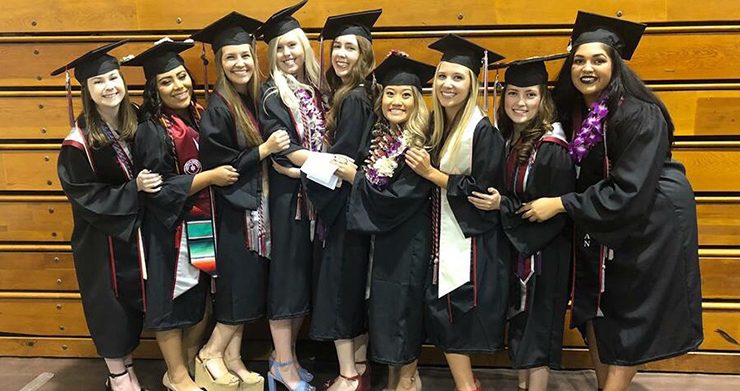
The Magic of the MACI Program
November 2, 2018
Current MACI program residency students, Marina Ballesteros and Danielle Pomeroy, along with MACI advisor and IES Associate Professor Dr. Noah Golden share their insights on the MACI program, an accelerated program in the Attallah College of Educational Studies that allows for the completion of a bachelor’s degree, Master of Arts in Curriculum and Instruction (MACI), and a California teaching credential within 5 years. The current MACI program application is available and is due on January 15, 2018.
Marina Ballesteros
Marina Ballesteros ’18 has BA in Integrated Educational Studies (Emphasis in Teaching and Learning in Schools) with minors in Language and Literacy and Dance.

Marina Ballesteros ’18
What inspired you to join the MACI program?
I was inspired to join the MACI program because ultimately it would allow me to get into the profession more quickly with a graduate degree. When I was in elementary school, my mom went back to college. I saw how hard it was for her to work, go to class, do homework, and still be around for me. It was a lot of stress for her to have to go back to school later in life, so this is something I did not want to do. Doing the MACI program would allow me to go into the field with more education, higher on the pay scale, and I would not need to go back to school once I was in the profession. While I may decide to go back to school later down the road for another master’s degree or an administrative credential, I will not have to worry about working on a master’s while in my first few years in practice.
What are your future aspirations, and how has the MACI program prepared you for them?
My future aspiration is to become an elementary school teacher. The program has prepared me by providing the opportunity to learn the best teaching methods and practice them in the field. Fieldwork in undergrad and student teaching during the 5th year is the best part because you get to apply what we have learned in our classes. I was very nervous going into fieldwork and student teaching, but all of the classes in IES (Integrated Educational Studies) and MACI have prepared us so well. I was only able to realize once I got into student teaching how much I knew and how prepared I really was.
What is your favorite aspect/class of the MACI program (the residency year)?
I think what makes MACI stand out from other residency programs is that you are there with your master teacher from day one and during the entire day with the teacher. Student teachers from other universities are only there one or two days a week for a few hours and they have multiple classes at night. With the MACI program, I see all of the ins and outs that go into teaching. There is so much more that goes into teaching than just preparing and teaching lessons. Being with my master teacher all day and throughout the week is giving me invaluable experience that I will be able to take with me when I have my own classroom. Getting all of this experience will make me a better first-year teacher, so it’s my favorite part of the program.
What’s the biggest difference between undergraduate education and graduate education?
I think the biggest difference is that the work is geared a lot toward our experiences in the field. It is also evident that you will get out of it what you put in. Sure you can get away with not doing the reading homework here or there. But at this point, everything is so important and relevant to your professional development as a teacher that it’s important to stay on top of all homework and assignments so you can be the best educator you can be.
What advice do you have for undergraduates who are in the process of figuring out what they want to do and are considering the MACI program?
I would say if you want to be a general education teacher in California (maybe even another state), this program is worth it. While other programs may seem like they cost less, you are able to get your master’s and credential in only one year and get into the field a lot sooner. The experience itself is also worth it in my own opinion. Being able to get so much time and experience in the classroom is priceless.
Anything else you would like to share about the MACI program.
I have said many times that coming to Chapman was one of the best decisions I will ever make in my life. I think choosing MACI will also be one of them. Although it is a new program and it is a learning process for everyone involved, my advice is to stay patient and be a good communicator. If everyone continues to communicate with one another, things will get figured out and life will be a lot easier!
Danielle Pomeroy
Danielle Pomeroy ’18 has a BFA in Creative Writing with a minor in Secondary Education.

Danielle Pomeroy ’18
What inspired you to join the MACI program?
I was deferred from study abroad after I was initially accepted in the spring of 2016. If I had not been deferred, I would not have been able to enroll in this program because of my position as a rising junior. Once my acceptance was deferred, I was chatting with my Big from Gamma Phi Beta who was an IES major. She mentioned the MACI program to me, and an old spark of my passion for education was reignited. When I was 5 years old, I decided I wanted to be a teacher but that dream faded as my passion for literature and creative writing grew more prominent. I decided that I would combine my love for education with my exuberance for literature and creative writing by teaching high school English.
What are your future aspirations and how has the MACI program prepared you for them?
I want to be a high school English teacher, as well as a published author. The MACI program has been an excellent way to expedite the process. I will graduate with my master’s degree in teaching as well as my teaching credentials. The MACI team has made this process as smooth as humanly possible. They coordinated our one-year residency positions, gave us guidance on paperwork, and deadlines to hold us accountable. I am really happy that I decided to commit to this program, not simply based on how efficient it is, but also effective. I have had access to different classes with professors who have taught in other teacher-preparation programs and they claim that MACI has the best class options out there.
What is your favorite aspect/class of the MACI program (the residency year)?
Honestly, the best part about this residency year is the residency itself. Being in a real classroom setting has been a mind-blowing experience for me. From day 1 I knew that I made the right decision. I love this job! My master teacher and I work so well together, which I am grateful for, and I feel like an equal in her classroom. The students and I get along well and I love enriching their lives in any way possible—because that’s what they do for me each day. I look forward to work every day and am sad when I have to miss classes.
What’s the biggest difference between undergraduate education and graduate education?
The biggest difference between undergraduate education and graduate education is the freedom. You think undergrad teachers are laid back? Wait till grad school. My professors have been incredibly trusting and open, continuously offering themselves as resources, as well as looking to my cohort for feedback to improve their pedagogy. My graduate education teachers allow us to vent when we need to; they listen in a way that I feel undergraduate professors can’t because the focus is so much more on the curriculum than on the individual students. In this program, the professors want to know what they can do to help us achieve our best. I’m not saying that that isn’t what I experienced in my undergraduate education within the IES program, but there is a different level of openness and flexibility in my grad program that didn’t exist in my undergrad.
What advice do you have for undergraduates who are in the process of figuring out what they want to do and are considering the MACI program?
Just go for it. The worst thing that could happen is you decide to drop out of the program. If you want to be a teacher, do the program. By getting your master’s in education, you will start off with a higher salary than if you simply have a bachelor’s degree. You will also be more appealing to schools looking to hire new teachers. Not only that, but there are not a lot of other universities at this caliber that offer such a hands-on program. If you decide you don’t want to do it, that’s okay. There is no shame in changing your mind. But personally, I say go for it.
Dr. Noah Golden
Dr. Noah Golden is an assistant professor in the Attallah College of Educational Studies.

Dr. Noah Golden
Why do you think students should join the MACI Program?
First of all, if students are interested in becoming teachers in a K-12 setting, MACI is a really powerful and accelerated program. Within five years you have your master’s and your credential, plus your bachelor’s degree—so you satisfy your undergrad program and a Master of Arts in Curriculum and Instruction (MACI).
For the undergrad students who are Integrated Educational Studies (IES) majors, the unique thing is that we start talking about social foundations earlier. We talk about society, and we talk about systems of privilege and oppression. We talk about the role that schools have historically played and the roles we might want schools to play. We talk about ethical issues. We talk about community-based organizations and involvement. So, we have a really different angle on education through our educational studies major that most traditional education majors don’t.
I think this breadth allows you to think about theory and methodology, before you start thinking about the nuts and bolts of teaching, which would be known as method. The MACI program is designed to take on the big picture questions, and it involves fieldwork and reflection and reflexivity, in a way that allows people to think about the how’s and the why’s of what they will do in the classroom before they think about the what. In the final two years of MACI—the senior undergrad year and the MACI residency year—students really focus on the specific tools. They’re designing and developing their tool kits, as teachers, in a way that is so much more informed and responsive to students’ strengths and needs than what I see happening in other programs, including the programs I went through to become a teacher.
I think the MACI Program offers a unique and powerful way to become a teacher who is really attuned to the role that education can and, in my opinion, should play in creating opportunity for young people.
Excerpt from the Attallah College Undergraduate Student Newsletter. Questions were curated by Nicole Williams.

